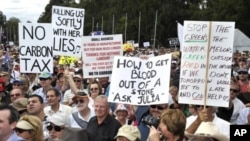Australian businesses are reacting to the details of a new carbon tax which has been lauded by environmentalists as historic but condemned as economic madness by critics. Despite the criticism, analysts say Australia lags behind parts of the developed world when it comes to efforts to reduce the country’s soaring carbon emissions.
Critics of Australia’s proposed pollution tax have argued that the government in Canberra should wait until other countries move to price carbon. The conservative opposition leader Tony Abbott said that a “unilateral carbon tax” would be an act of “economic self-harm.”
The proposed measure, which would take effect next July, forces the country’s 500 worst polluters to pay $25 for each metric ton of carbon dioxide that they emit.
However, environmental researchers insist that Australia needs to act now because its coal-dependent economy is more carbon intensive than many others.
Ben McNeil, a senior fellow at the Climate Change Research Center at the University of New South Wales, says that Australia is, in fact, well behind other Western countries.
“In the U.K. for example they've had about three different price signals, they have had a climate change levy 10 years ago," said McNeil. "They are also part of the EU trading scheme and they've also had a number of other carbon levies along the way in particular sectors. In Europe, they are really well ahead. In the U.S. they are still trying to formulate and trying to get through a carbon price in Congress.”
In the United States, there is a non-binding Regional Greenhouse Gas Initiative, which covers the electricity in 10 states in the country’s northeast. California is expected to experiment with an emissions trading scheme in the next few years.
New Zealand also has set a price on carbon. Australia plans to introduce a similar mechanism in a year’s time before moving on to an emissions trading scheme in 2015.
Canberra’s experience dealing with such a complex and contentious system will be carefully watched, especially across Asia. Japan and South Korea have plans to bring in emissions trading schemes and China is considering a pilot system in some of its provinces.
Australia is one of the world’s worst per capita emitters of greenhouse gases that many scientists blame for warming temperatures.
Prime Minister Julia Gillard says the carbon tax will cut Australia’s emissions by 160 million tons within a decade - or the equivalent of taking 45 million cars off the road. The government says it has just enough votes in parliament to pass the legislation.
The levy is Australia’s biggest economic reform in a generation. Gillard says the country’s 500 worst polluters will innovate and change as they strive to reduce their emissions and cut their tax bills.
Steelmakers, coal mines and electricity generators will receive compensation to ensure they stay in business, while other tax cuts will sweeten the deal for millions of Australians. Critics, though, believe the carbon scheme will damage the nation’s economy that is dependent on cheap supplies of coal.
Australia to Catch Up With Europe as Carbon Tax Details Emerge
- By Phil Mercer











